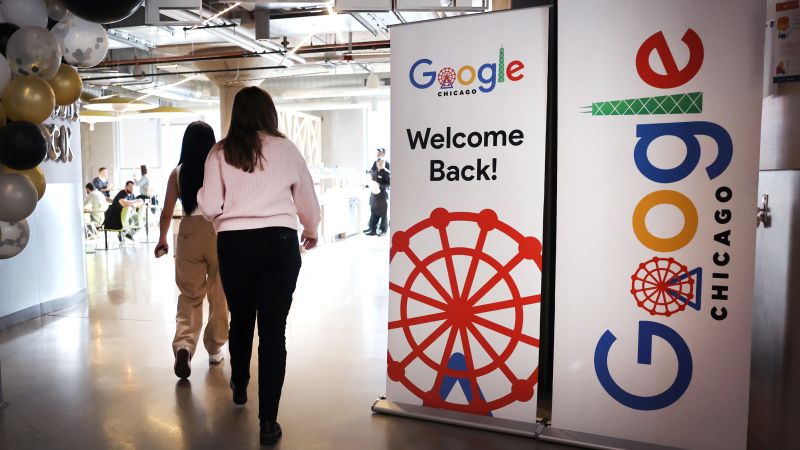Of all the industries trying to force people back into offices, the tech business might be the most absurd. Really just goes to show how silly it is. There is zero reason for me to be in an office to do my job.
Let’s all go back to the office to get on Teams/Zoom calls.
That’s exactly what my office does. We even have to clock in and out with an app that only activates when connected to the office wifi. Getting the hell out of here.
Wow they have you clocking in and out? What is this, McDonald’s? Who does that?
Call centers, for sure.
As a disabled woman I need fully remote work. The longer I’ve worked in tech the more I’ve seen that an office really isn’t needed. If you like being in an office and the company wants to provide one then that’s great but there is no reason to require it.
Depends on the tasks at hand, I think.
Just writing code or discussing things in meetings feels much better remote. IMO things like mentoring juniors or on-boarding new colleagues is pretty hard when you’re not sitting next to each other.
And that’s why I love my company’s policy. Basically, we have two days “mandatory” at office (i.e. you’re expected to be in, unless you have obligations), and our VP has committed to three days minimum remote and stuck by that. And we’re totally cool with people doing full remote for a month or whatever if they are doing an extended trip or have some other reason why coming into the office is impractical.
So all of the mentoring and whatnot happens on those two days. It works quite well because the barrier to collaboration is lower those two days, and people still have the majority of their work remote for better focus and comfort.
We’re not a tech company, but I do have a tech job, so I’m very happily surprised that my org is so sensible.
The best on-boarding experience I’ve ever had was with a remote company. I think it’s more that companies still haven’t adapted properly to remote working, or have paid lip service to it. If a company does it well, it can be excellent, I’d argue better than in-person because it’s more inclusive.
I’m not in tech, but work in the public service sector with offices and all that, and we’ve been under a similar in-office twice a week mandate for a few months now, after 2.5 years of working from home due to COVID. I do see some value of being in the office occasionally - it’s nice to be able to talk to your co-workers face to face, and at least in my line of work, meeting with clients/partners face-to-face is incredibly important.
It’s not all sunshine and rainbows, though. The office complex I’m in has been woefully outdated for over a decade and they’re only getting around to renovations now, which has led to everyone having to cram on far too few floors during workdays (though it’s better than having to work in the old sections filled with asbestos, bed bugs, and bats in the ceiling). Commuting still sucks and will always suck (and costs too much money + pollution!). At times, it feels like coming into the office is just a formality and it’s a crappy feeling being at a desk all day when I know for a fact I could be doing all my work from home just fine.
The largest issue I feel I have with it, though, is the fact that it causes centralization in our specific city, and prevents people who don’t live within driving distance of the core to reasonably be able to work. During COVID, my department was able to hire a slew of employees from across the country for 100% remote work - people who would have never gotten the chance to have such a job simply because they don’t live in one specific city timezones away. Now that we’re not only back in the office, but that upper management places such an importance on being in the office for the sake of being in the office instead of using the office space in meaningful ways, I feel like it’s a step backwards from being able to expand the talent pool, improve people’s work-life balances, cut back on our physical and carbon footprint, and reduce our cost of living.
It doubly makes me roll my eyes due to the fact that a large reason why we’re even back in the office now was because the local government feeling that it was the duty of us office workers to support downtown restaurants/businesses. I kid you not, the higher-ups behind this decision were making public statements about how important it is for us to go and spend our money through lunches and other things to stimulate the local economy - but guess what! No pay raises and we haven’t had any in 3 years despite record inflation and the rising cost of living! No - instead of these businesses having to adapt and shift their approach to the new post-COVID reality, we all have to lug our sorry asses in to spend money instead.
It doubly makes me roll my eyes due to the fact that a large reason why we’re even back in the office now was because the local government feeling that it was the duty of us office workers to support downtown restaurants/businesses.
I swear a significant chunk of my employer’s motivation to get people into the office is that they’re paying rent on it.
The way to get workers back is to increase pay and reduce working hours.
First, we’ve all gotten used to the extra time from the lack of commute. I can’t imagine going back to a commute.
Secondly, the quality of life and the cost savings from working from home are tremendous. I don’t buy coffee, I just drink the coke coffee in the pot. I don’t buy lunch, I eat leftovers or make a quick sandwich. And I am so much more comfortable working from home instead of sitting in an office where I don’t control the aircon surrounded by distractions.
If you want me in office double my pay and reduce me to 30 hours a week.
So workers will revolt and now would be a great time to have a business that puts in writing in their policy that 100% remote work will always be allowed
I see a lot of debate as to whether working in the office or working from home is better for xyz situations. I think it’s important to recognise that we are all individuals, and we will all find different ways of working more beneficial for ourselves.
I am autistic and find working in an office to be extremely overwhelming and distracting. I prefer to be in my own home where I am comfortable and can control my surroundings precisely (light, temperature, background noise, etc). I have always been able to meet my work deadlines and have only been praised for my work and have also got pay raises for my performance whilst working from home.
My company was never planning on making people return to the office. However, my company got bought out by another company and we are now forced to come into the office at minimum three days a week.
My new company claims to want to “remove barriers for neurodiverse people working at the company” but is also saying “we all work better in the office”. These two statements contradict each other as being forced to come into the office is certainly a barrier to many neurodiverse people including myself. I’m sure for a great many people returning to the office is beneficial but nobody can claim that this is better for absolutely everyone.
In my case I contacted an employment lawyer and they told me I may potentially have a case for being discriminated against for my disability. I was encouraged to formally submit a motion to change my contract to a permanent remote working one which, if this is rejected, I may be able to follow up with taking my company to court. My doctor, my company’s doctor, and my company’s lawyers currently all agree that this motion should be approved but I am still waiting on the final decision…
It’s super interesting to see this develop. I was working in a super fancy office before the pandemic and I do have to say I miss the serendipitous interactions and the ease of making connections.
I never bought into the “remote is universally better” message some of the tech CEOs touted in 2020. It’s all trade offs. I do think in-person by default, with flexibility to work from home 1-2 days a week, plus some teams being 100% remote is probably a good sweet spot. But I love all the experimentation going on right now.
I agree with this whole heartedly. I think the issue, remote or at work, comes down to the fact that it isn’t the workers making the choice, but their boss. For me, I don’t do tech work, so I have to go into work because I’m legitimately doing work with my hands. And I like it that way. I know that if I had to work from home, I would become miserable QUICK. That’s just my personality.
But the choice is made from up high, from people who don’t give two shits about the workers. As with all things.
Workers have power though… although I guess mostly though if you’re either in tech or in a union. Or both.
I recently left a tech job that was 100% remote for one that requires 2 days a week in the office.
When I started the remote only job it was good, I had people I talked to on a daily basis, we did all our ceremonies (bi-weekly meetings) over Teams, we were pretty productive and there were few distractions.
Over time though they pushed for more people to be back in the office, but as someone who lived the other end of the country this wasn’t really an option for me. I gradually felt more isolated, I started dreading the ceremonies because everyone else could have proper human interaction and they often forgot about the one or two guys at the end of the Teams calls.
I don’t love my new commute - it takes too long, there is too much traffic - and eating out in the city is expensive, I’m often distracted because of office chats that really don’t need to happen, and I don’t get to take my kids on the school run every morning.
But I don’t get forgotten about and I get to talk to adults who aren’t my wife and kids a couple of times a week.
So far it’s working and I’m pretty happy, but I really hope they don’t start wanting more than two days a week in person.
Sounds like the problem here is that your colleagues are your only social circle outside of family rather than remote work being isolating. I think it’s unhealthy to have work relationships take up a significant part of your social contacts in general, because you’ll have a less rational perspective on your job when you associate it with friends. You might be reluctant to leave a job with poor compensation and hours because all of your friends are there, for example. My commute to work and back takes over 2 hours a day and it’s much easier to be peer-pressured into working overtime when you can see everyone else doing so. All of this only benefits the employer. I’d rather work remotely and spend the saved time with people I choose to be with.
They’re not, I have a social group I speak to daily in discord, weekly over zoom and in person every couple of months.
My commute is only 20 minutes each way so it isn’t terrible, I would probably have a worse opinon of it it took any longer.
I’ve not been asked to do overtime so far, I’m not really too sure how I would respond if they asked me to do it.
Oh that would be reasonable then, a 2 day on-site work hybrid schedule with 40 minutes of commute and no overtime certainly isn’t something I would complain about (unlike my current workplace, lol). I assumed the commute was much longer and also read the comment incorrectly because I read it as the new workplace was pushing for fully on-site work as well.
I can meet with exactly two people from my team of eight in the office. I have no advantage of going to the office but somehow the management doesn’t want to understand that…







